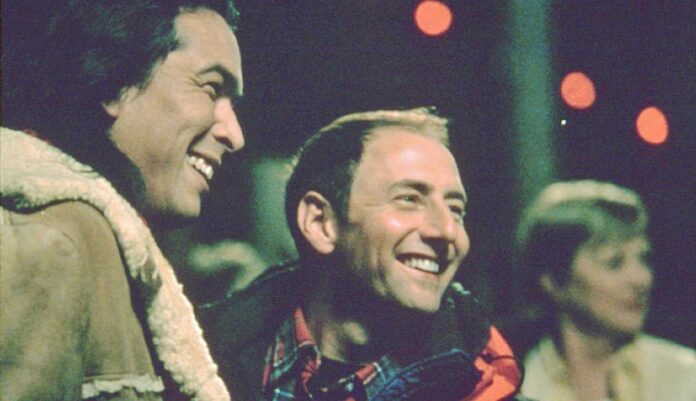Out gay filmmaker Thomas Bezucha has a new film, “Let Him Go,” now out in theaters. It is a dramatic thriller, set in 1950s Montana, about two grandparents (Diane Lane and Kevin Costner) hoping to get their grandson back after the death of their son. (His widow had remarried and moved away, abruptly, with the child).
“Let Him Go” is a tense, engrossing, and at times violent film. It is also a change of pace for the director whose auspicious debut, the feel-good gay romance, “Big Eden,” had Henry (Arye Gross), a closeted grandson, returning to Montana to care for the infirmed Sam (George Coe), who raised him. Henry also grapples with his feelings for Dean (Tim DeKay), the one who got away, while, another man, Pike (Eric Schweig), secretly pines for Henry.
The filmmaker chatted with PGN about “Big Eden,” which is celebrating its twentieth anniversary this year.
“Big Eden” has developed a warm, dedicated fanbase over the last two decades. Why do you think so many folks have connected with this film?
It was out the same year “Trick” came out, and the gay men in “Big Eden” didn’t look like men in other typical gay movies. There was something to that, definitely, at the time. That resonated with people — as did the universal desire for family.
The film is set in a town in Montana where people are very accepting of Henry and his sexuality, even though Henry is not quite comfortable in his own skin. This is not so much a coming out film, as it is a film about learning to love yourself. Can you talk about that aspect of Henry’s character?
You’re striking on something. The question I was asking myself was: If we took away all homophobia and the external forces working against you, would you be any more comfortable as yourself? What is it inside you that holds you back? That was why I didn’t want anyone resistant in the community. The most resistant person is Henry himself. Everything would be ok if he’d lighten up.
I like that the men in “Big Eden” — even the supporting cowboy characters — are not typical macho guys. Can you talk about the portrayal of masculinity in “Big Eden”? I will add that “Let Him Go” has a fascinating portrayal of masculinity too, but I can’t discuss it without spoiling!

The men in these films — they are what they are. Diane [Lane]’s character is the driver in “Let Him Go.” She’s making the action go forward. Kevin’s character is the bodyguard — again. In “Big Eden,” I liked that Pike was a nod to “Babette’s Feast,” and there’s a bit of a “Cyrano” thing in that he leads Henry to believe that the Widow Thayer (Nan Martin) is doing the cooking. I love this big mountain of an Indian in the kitchen, and I love the cowboys. Fooling with people’s expectations is fun.
I appreciate that you feature an indigenous character in “Big Eden” as the gay love interest. What makes the dynamic between Pike and Henry that is so appealing?
I can’t remember how I made Pike an Indian, but I came up with his name, and in my mind, he was half Native American. When it became time to cast, I knew it had to be a Native American actor. Gay people come in all packages, and I remember Eric [Schweig] was moved and motivated to play Pike. He said he was doing it for his unseen brothers and sisters in the gay Native American community. He felt a real responsibility, and he wanted to make sure he honored those people.
Another parallel I see in your films are the dinner table scenes. In “Big Eden,” it is a Thanksgiving meal where various characters reveal their romantic feelings with just looks. In “Let Him Go,” a dinner table scene has a different, more sinister tone. You also have one in “The Family Stone.” Can you talk about these sequences, and creating tone in your films?
I love an uncomfortable dinner table. I grew up at many of them. I love dinner table scenes because the actors are anchored. That may be my favorite scene in “Big Eden.” I love watching with an audience because it plays really well. As a writer, I did my job. There’s no dialogue but the audience can read everyone’s minds at the table — that’s really fun. It’s all subtext. It’s true in “Let Him Go,” too. Blanche’s (Leslie Manville) long monologue is staking her claim and letting [everyone] know she’s in charge
You were a rookie when you made “Big Eden.” What lessons did you learn about yourself from that experience that may have even helped you on “Let Him Go”?
What I learned is that I could do it. I would love nothing more than to do it more frequently. I had a whole previous life designing stores for Ralph Lauren, so I knew I could lead a group of people on a creative expedition. The big unknown was working with actors. I had beyond no experience. So that was the big discovery was that I loved it — working and experimenting with them. If you have written the script, the actors give you credit.
If you were to make, or remake, “Big Eden” today, what would you do differently?
Oh, my God! We would have more shoot days. I always had this feeling making “Big Eden” of running through a burning house. You have no time to think, you just want to get out alive. Twenty years later I made “Let Him Go,” a movie with a burning house, so I’ve come full circle!
